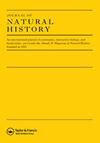Molecular and morphological analyses reveal a new hypogean species of amphipod in the genus Crangonyx Bate, 1859 (Crustacea: Crangonyctidae) within the floridanus species complex, from Suwannee County, Florida
IF 0.9
4区 生物学
Q4 BIODIVERSITY CONSERVATION
引用次数: 0
Abstract
ABSTRACTCrangonyx stinei sp. n. is described from Peacock Springs Cave, in Wes Skiles Peacock Springs State Park, Suwannee County, Florida. Crangonyx stinei sp. n. was collected from the cave benthos via SCUBA cave diving techniques. Molecular analyses of the nuclear 18S and 28S rDNA and mitochondrial 16S rDNA reveal significant phylogenetic differences between C. stinei sp. n. and closely related Crangonyx spp. Crangonyx stinei sp. n. is the sixth member of the floridanus species complex in the State of Florida, but only the second to be described from a hypogean habitat. To determine the biogeographic range of C. stinei sp. n., additional collecting in both epigean and hypogean systems is needed.http://www.zoobank.org/urn:lsid:zoobank.org:pub:39692E06-EBAA-492B-91FD-20EBB5D5C242KEYWORDS: 18S rDNA28S rDNA16S rDNAcavesFloridan aquiferCrangonyx stinei sp. n. AcknowledgementsWe sincerely thank Rodney J. King, and Nicholas H. Coppock for their assistance with collection efforts. We are grateful to the Florida Department of Environmental Protection and to state park rangers and staff at Wes Skiles Peacock Springs State Park for their courtesy and professionalism. We thank two anonymous reviewers for their constructive feedback.Disclosure statementNo potential conflict of interest was reported by the authors.Supplementary materialSupplemental data for this article can be accessed online at https://doi.org/10.1080/00222933.2023.2247155Additional informationFundingSupport for this project was by Title III funding received from the US Department of Education.分子和形态学分析表明,1859年,美国佛罗里达州Suwannee县(Suwannee County)的fridanus物种复群中发现了一新种(甲壳纲:Crangonyx Bate)
摘要:在美国佛罗里达州苏旺尼县韦斯·斯凯尔斯孔雀泉州立公园孔雀泉洞中发现了一种缟玛瑙。采用水肺洞穴潜水技术,从洞穴底栖动物中采集了蓝玛瑙(Crangonyx stinei)。核18S、28S rDNA和线粒体16S rDNA的分子分析表明,C. stinei sp. n.与近缘的Crangonyx spp.之间存在显著的系统发育差异。Crangonyx stinei sp. n.是佛罗里达州floridanus物种复合物的第六个成员,但仅是第二个从近缘栖息地描述的成员。为了确定C. stinei sp. n.的生物地理范围,需要在上古系和下古系进行额外的收集。http://www.zoobank.org/urn:lsid:zoobank.org:pub:39692E06-EBAA-492B-91FD-20EBB5D5C242KEYWORDS: 18S rDNA28S rDNA16S rDNAcavesFloridan aquiferCrangonyx stinei sp. n.感谢Rodney J. King和Nicholas H. Coppock对收集工作的帮助。我们感谢佛罗里达环境保护部和州立公园护林员以及韦斯·斯基尔斯孔雀泉州立公园的工作人员,感谢他们的礼貌和专业精神。我们感谢两位匿名评论者的建设性反馈。披露声明作者未报告潜在的利益冲突。补充材料本文的补充数据可在https://doi.org/10.1080/00222933.2023.2247155Additional上在线获取信息本项目的资金支持由美国教育部提供的第三章资金支持。
本文章由计算机程序翻译,如有差异,请以英文原文为准。
求助全文
约1分钟内获得全文
求助全文
来源期刊

Journal of Natural History
生物-生态学
CiteScore
1.60
自引率
12.50%
发文量
74
审稿时长
4-8 weeks
期刊介绍:
Journal of Natural History is an international zoological journal publishing original research and reviews in evolutionary biology and ecology. It maintains its historical niche by publishing a broad range of systematics papers on all animal phyla from Porifera to Chordata, encompassing traditional taxonomic revisions and descriptions, cladistic analyses and molecular phylogenetics and phylogenomics. The journal has recognized strengths in entomology and marine invertebrates, but also welcomes papers on the natural history of all animal species and on the interactions of species with their environment. Preference is given to in-depth papers and extensive taxonomic reviews: single species descriptions and checklists are not normally considered. Authors wishing to suggest a review paper should contact the relevant editor.
 求助内容:
求助内容: 应助结果提醒方式:
应助结果提醒方式:


